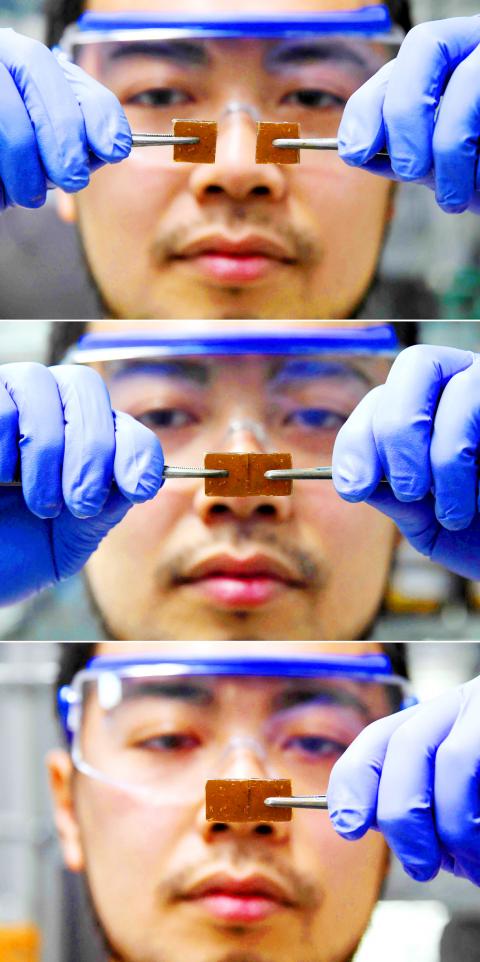A Japanese researcher has developed — by accident — a new type of glass that can be repaired simply by pressing it back together after it cracks.
The discovery opens the way for super-durable glass that could triple the lifespan of everyday products like car windows, construction materials, fish tanks and even toilet seats.
University of Tokyo chemistry researcher Yu Yanagisawa made the breakthrough by chance while investigating adhesives that can be used on wet surfaces.

Photo: AFP
Does this mean you will soon be able to repair those cracks in your smartphone with a quick press of the fingers? Or surreptitiously piece together a shattered beer glass dropped after one pint too many? Well, not quite. Not now and not in the near future.
However, it does open a window of opportunity for researchers to explore ways to make more durable, lightweight, glass-like items, like car windows.
In a demonstration, Yanagisawa broke a glass sample into two pieces.
He then held the cross sections of the two pieces together for about 30 seconds until the glass repaired itself, almost resembling its original form.
To demonstrate its strength, he then hung a nearly full bottle of water from the piece of glass — and it stayed intact.
The organic glass, made of a substance called polyether thioureas, is closer to acrylic than mineral glass, which is used for tableware and smartphone screens.
Other scientists have demonstrated similar properties by using rubber or gel materials, but Yanagisawa was the first to demonstrate the self-healing concept with glass.
The secret lies in the thiourea, which uses hydrogen bonding to make the edges of the shattered glass self-adhesive, according to Yanagisawa’s study.
However, what use is all this if it cannot produce a self-healing smartphone screen?
“It is not realistically about fixing what is broken, more about making longer-lasting resin glass,” Yanagisawa said.
Glass products can fracture after years of use due to physical stress and fatigue.
“When a material breaks, it has already had many tiny scars that have accumulated to result in major destruction,” Yanagisawa said. “What this study showed was a path toward making a safe and long-lasting resin glass,” which is used in a wide range of everyday items.
“We may be able to double or triple the lifespan of something that currently lasts for 10 or 20 years,” he added.

Packed crowds in India celebrating their cricket team’s victory ended in a deadly stampede on Wednesday, with 11 mainly young fans crushed to death, the local state’s chief minister said. Joyous cricket fans had come out to celebrate and welcome home their heroes, Royal Challengers Bengaluru, after they beat Punjab Kings in a roller-coaster Indian Premier League (IPL) cricket final on Tuesday night. However, the euphoria of the vast crowds in the southern tech city of Bengaluru ended in disaster, with Indian Prime Minister Narendra calling it “absolutely heartrending.” Karnataka Chief Minister Siddaramaiah said most of the deceased are young, with 11 dead

By 2027, Denmark would relocate its foreign convicts to a prison in Kosovo under a 200-million-euro (US$228.6 million) agreement that has raised concerns among non-governmental organizations (NGOs) and residents, but which could serve as a model for the rest of the EU. The agreement, reached in 2022 and ratified by Kosovar lawmakers last year, provides for the reception of up to 300 foreign prisoners sentenced in Denmark. They must not have been convicted of terrorism or war crimes, or have a mental condition or terminal disease. Once their sentence is completed in Kosovan, they would be deported to their home country. In

Brazil, the world’s largest Roman Catholic country, saw its Catholic population decline further in 2022, while evangelical Christians and those with no religion continued to rise, census data released on Friday by the Brazilian Institute of Geography and Statistics (IBGE) showed. The census indicated that Brazil had 100.2 million Roman Catholics in 2022, accounting for 56.7 percent of the population, down from 65.1 percent or 105.4 million recorded in the 2010 census. Meanwhile, the share of evangelical Christians rose to 26.9 percent last year, up from 21.6 percent in 2010, adding 12 million followers to reach 47.4 million — the highest figure

LOST CONTACT: The mission carried payloads from Japan, the US and Taiwan’s National Central University, including a deep space radiation probe, ispace said Japanese company ispace said its uncrewed moon lander likely crashed onto the moon’s surface during its lunar touchdown attempt yesterday, marking another failure two years after its unsuccessful inaugural mission. Tokyo-based ispace had hoped to join US firms Intuitive Machines and Firefly Aerospace as companies that have accomplished commercial landings amid a global race for the moon, which includes state-run missions from China and India. A successful mission would have made ispace the first company outside the US to achieve a moon landing. Resilience, ispace’s second lunar lander, could not decelerate fast enough as it approached the moon, and the company has